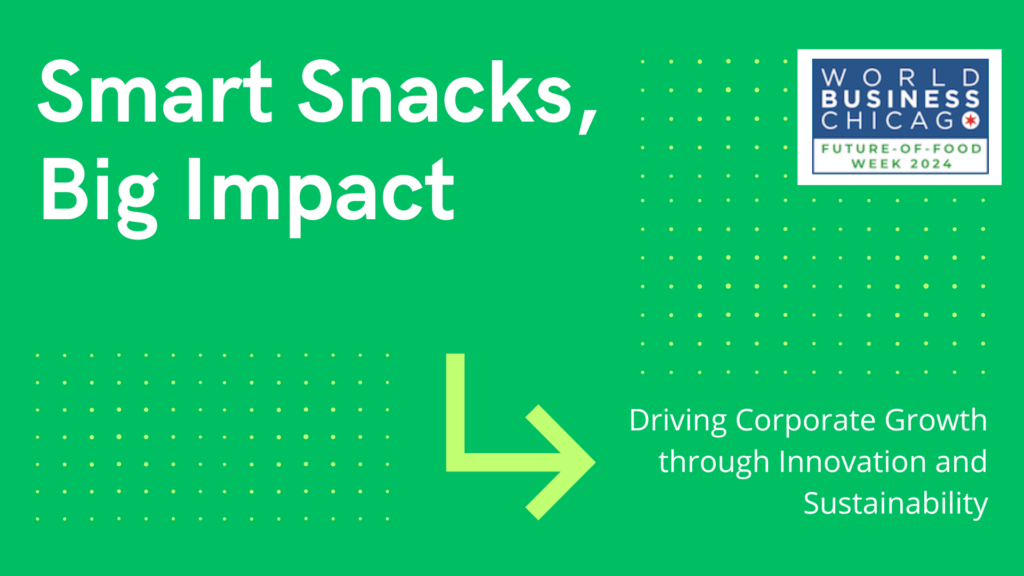
Mars Wrigley’s dedication to sustainability and innovation is on display during Chicago’s Future-of-Food Week by World Business Chicago [May 20-24, 2024]. In front of a room full of entrepreneurs, executives, and investors, TechNexus Venture Collaborative Founder and General Partner, Fred Hoch, sat down with Amanda Davies, Mars Wrigley Chief R&D, Procurement, and Sustainability Officer, to talk tactically about her organization’s zealous Sustainability & Innovation Playbook and why collaborating with ventures is the key to growth and success.
Bottom line: Mars Wrigley is on a mission to be THE partner of choice for startups.
This ‘no-holds-barred’ attitude and commitment to external partnerships is a testament to how established corporations, like Mars Wrigley, and ventures can work together to drive meaningful progress in the industry and beyond. By fostering an environment of learning, respect, and strategic collaboration, Mars Wrigley and its partners are paving the way for a sustainable and innovative future.
Driving Innovation and Sustainability
During their conversation, Amanda emphasized the importance of continuous learning from external partners, like early-stage ventures, as a means to accelerate the company’s goals and objectives.
One of the key themes in the Mars Wrigley strategy is integrating sustainability into its innovation processes. As an innovator, the focus is not just on creating products for today but also ensuring that these innovations benefit future generations.
“Honestly, the thread through my career is, is learning. And knowing that each and every day is a school day— there’s something new to learn, and it’s why I’m here today—to learn because I think all these challenges I talk about, be it innovation or sustainability, we need bold, brave start-ups [to tackle them together].” — Amanda Davies
Sustainability is at the core of Mars Wrigley’s operation. The company is dedicated to addressing climate change and achieving net-zero carbon emissions. For instance, their work in the dairy sector includes innovative practices like feeding cows seaweed to reduce methane emissions. This approach exemplifies how Mars Wrigley combines sustainability with innovation to develop products that are not only delicious but also environmentally friendly.
Leveraging Global Innovators
Mars Wrigley understands that to tackle the significant challenges of their business, bringing bold and brave entrepreneurs into the conversation is essential. The company actively seeks partnerships with startups, recognizing that these ventures bring fresh ideas and solutions to drive the industry forward. Led by Davies’ effective and empathetic leadership, Mars Wrigley has learned to work with startups, adapting their processes to make collaboration more accessible and effective.
One notable initiative is their new innovation hub in Chicago. This state-of-the-art facility is designed to foster collaboration with partners & startups and develop new, sustainable materials and products. By investing $42M into this hub, Mars Wrigley underscores its commitment to innovation and sustainability.
From the mouths of corporate leaders: Key Tactical Takeaways for Startups
- Understand the Corporation’s Challenges: Startups should clearly understand the problem statements and opportunity areas of corporations like Mars Wrigley. This strategic intimacy, as Davies refers to it, helps in aligning the startup’s solutions with the corporation’s needs.
- Demand Clarity: Be demanding and seek clarity about the corporation’s requirements. If the expectations are unclear, persist in asking for detailed explanations to ensure mutual understanding.
“You need to get to a solid understanding of what each other’s either pain points and opportunities are and what you bring. So, make sure you get that understanding, and if you haven’t gotten it, be demanding and say, “I still don’t understand what you’re trying to achieve. Tell me more”— because if you understand me, then you can speak in the language of our needs, versus in the language of the solution you have built.”
- Minimum Viable Progress: Startups should focus on understanding the minimum requirements needed to advance to the next stage of a collaborative relationship (i.e., pilot/POC/partnership agreement). Corporations should be more flexible when it comes to innovation projects. Avoid overwhelming documentation and procurement procedures, or consider creating data test environments to aim for simplicity and efficiency.
- Empathy and Respect: Mutual respect and empathy are crucial. Startups and corporations need to appreciate each other’s challenges and work together towards common goals and mutually beneficial outcomes.
Calling all Entrepreneurs: Mars Wrigley wants to hear from you. What’s the one piece of advice you have for Mars Wrigley to be a partner of choice? Add your thoughts in the comments.👇
